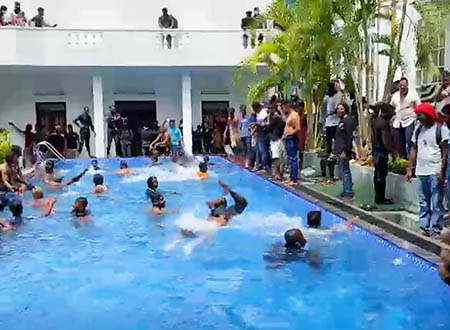Sri Lanka: Why is the country in an economic crisis?

Sri Lanka's president Gotabaya Rajapaksa has said he will step down, after crowds stormed his official residence in the capital, Colombo.
It follows months of protests over soaring prices and a lack of food and fuel.
The country's foreign currency reserves have virtually run dry, meaning it doesn't have enough funds available to buy goods from other countries.
What is happening in Sri Lanka?
The price of everyday goods has risen sharply. Inflation is running at more than 50%.
There have also been widespread power cuts.
A lack of medicines has brought the health system to the verge of collapse.
The country doesn't have enough fuel for essential services like buses, trains and medical vehicles, and officials say it doesn't have enough foreign currency to import more.
This lack of fuel has caused petrol and diesel prices to rise dramatically since the start of the year.
In late June, the government banned the sale of petrol and diesel for non-essential vehicles for two weeks. It's thought to be the first country to do so since the 1970s. Sales of fuel remain severely restricted.
Schools have closed, and people have been asked to work from home to help conserve supplies.
What happens when a country runs out of money?
As well as not being able to buy goods it needs from abroad, in May Sri Lanka failed to make a payment on its foreign debt for the first time in its history.
The country had been given 30 days to come up with $78m (£63m) to cover interest payments, but central bank governor P Nandalal Weerasinghe said it could not pay.
Two of the world's biggest credit rating agencies also confirmed Sri Lanka had defaulted on its debt payments.
Failure to pay debt interest can damage a country's reputation with investors, making it harder for it to borrow the money it needs on international markets. This can further harm confidence in its currency and economy.
Is there a plan to solve the crisis?
Sri Lanka's government has more than $51bn (£39bn) in foreign debt, $6.5bn of which is owed to China, and the two countries are in negotiations about how to restructure the debt.
The G7 group of leading industrial countries - Canada, France, Germany, Italy, Japan, UK and the US - has said it supports Sri Lanka's attempts to reduce its debt repayments.
The Sri Lankan government is also in talks with the International Monetary Fund (IMF) about a possible $3bn (£2.5bn) loan.
The IMF - which works with its 190 member countries to stabilise the world economy - has said the government would have to raise interest rates and taxes as a condition of any deal.
It would also require a stable government to be in place, so it is unclear what can be done until the president officially steps down and a new government is in place.
The World Bank has agreed to lend Sri Lanka $600m, and India has offered at least $1.9bn.
This article is from BBC News.

